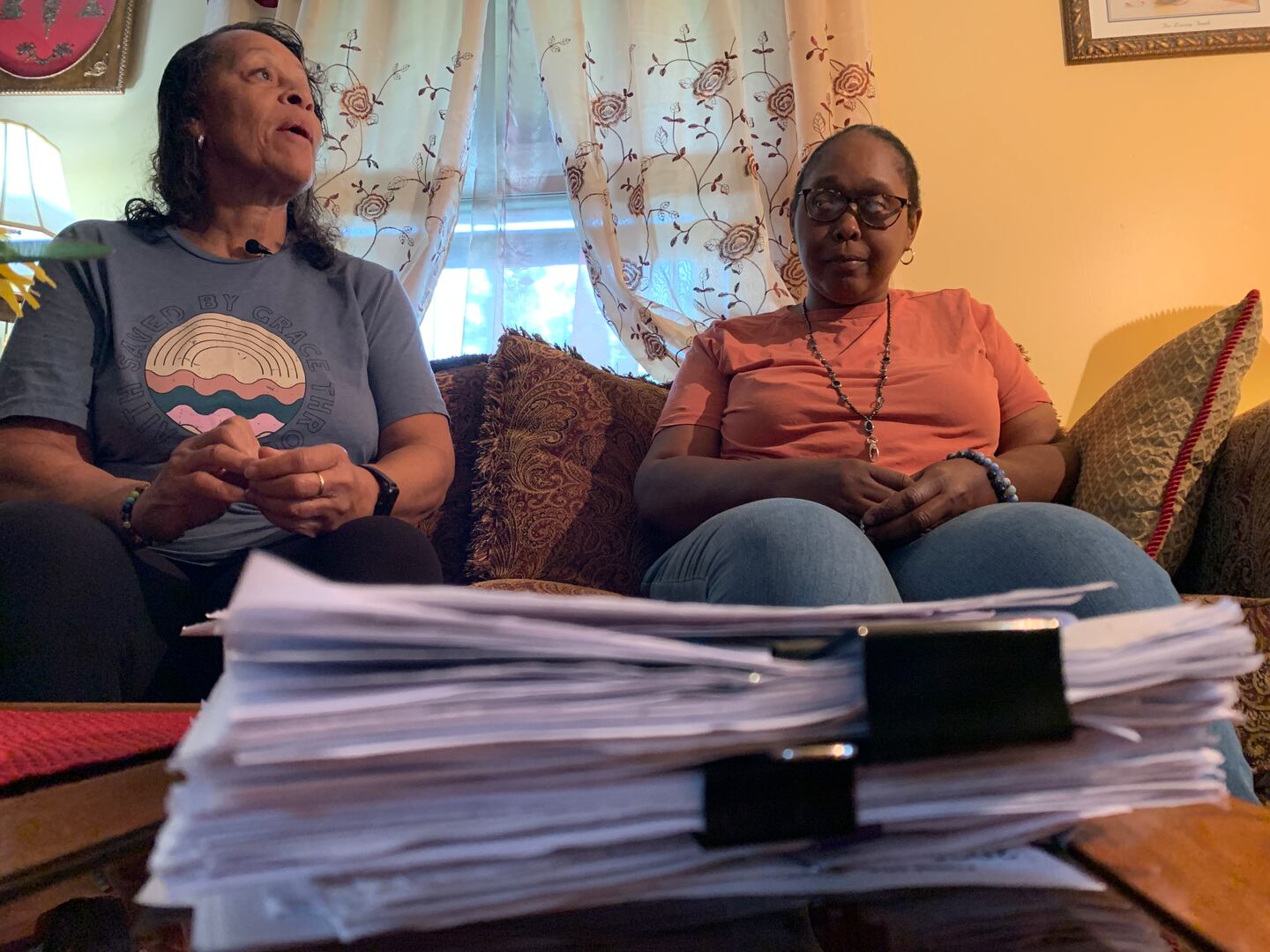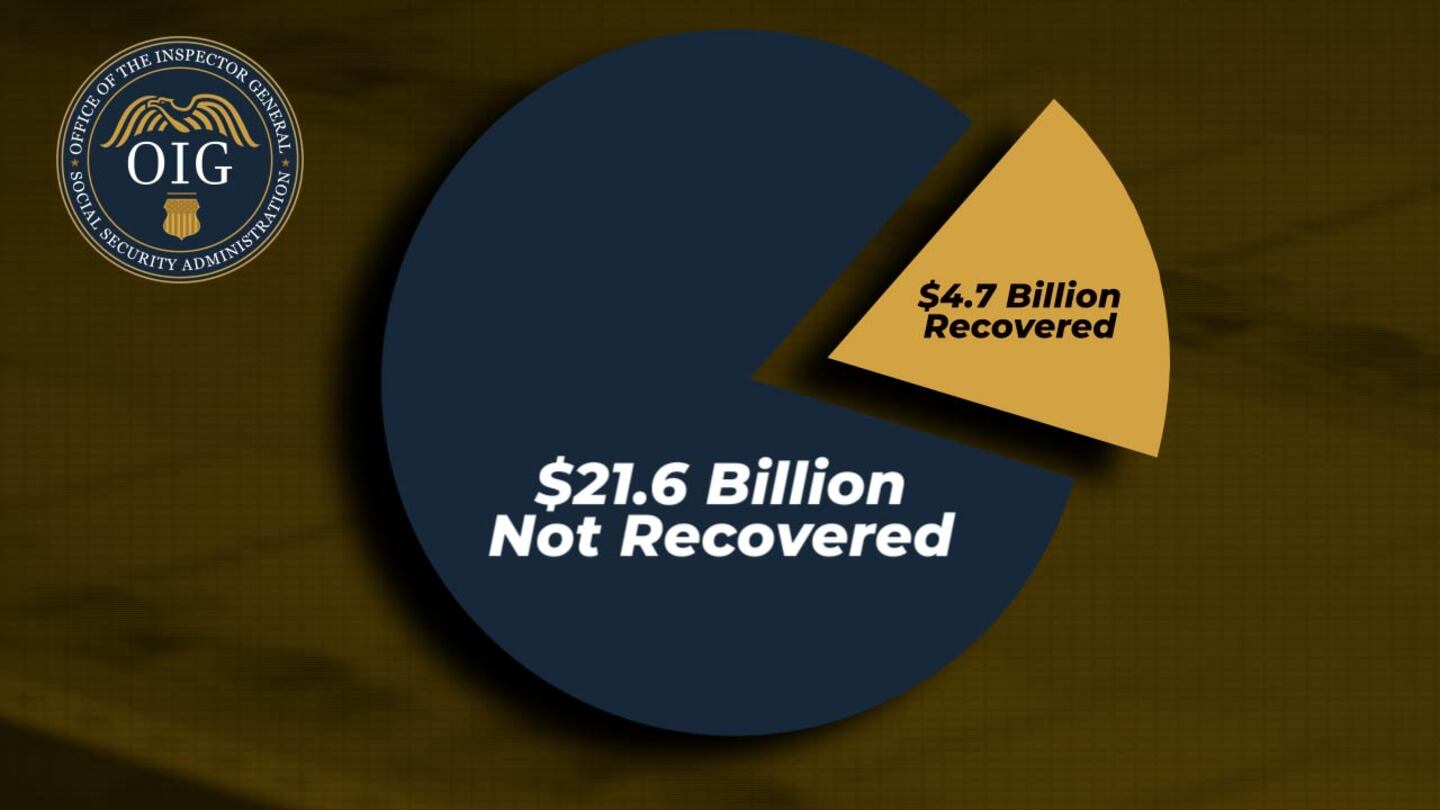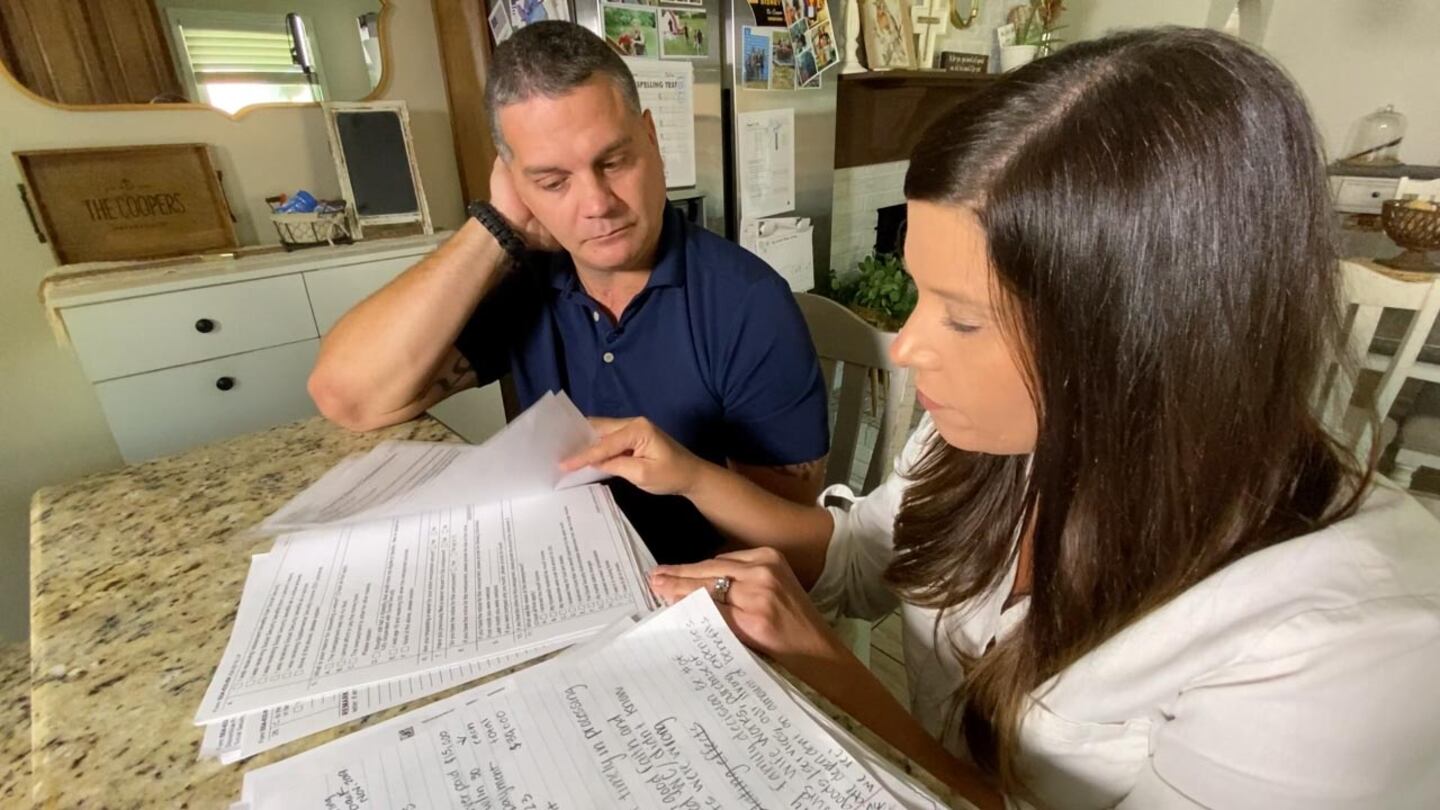Justina Worrell, 47, works part-time as a kitchen helper in an Ohio nursing home. She has cerebral palsy, an intellectual disability, and a cardiac condition that required she get an artificial heart valve at age 20.
A year ago, she was earning $862 a month and receiving about $1,065 in monthly Social Security disability benefits when a letter arrived from the federal government. The Social Security Administration had been overpaying her, the letter said, and wanted money back.
Within 30 days, it said, she should mail the government a check or money order.
For $60,175.90.
“Social Security should be to help people, not to destroy them,” Addie Arnold, Worrell’s aunt and caregiver, told KFF Health News and WHIO-TV in Dayton, Ohio.
The Social Security Administration is trying to reclaim billions of dollars from many of the nation’s poorest and most vulnerable — payments it sent them but now says they never should have received.
During the 2022 fiscal year, the agency clawed back $4.7 billion of overpayments, while another $21.6 billion remained outstanding, according to a report by SSA’s inspector general.
One consequence is a costly collection effort for the government and a potentially devastating ordeal for the beneficiary.
“We have an overpayment crisis on our hands,” said Rebecca Vallas, a senior fellow at the Century Foundation think tank. “Overpayments push already struggling beneficiaries even deeper into poverty and hardship, which is directly counterproductive to the goals” of safety-net programs.
The Social Security Administration declined an interview request from KFF Health News and Cox Media Group and would field questions only submitted by email.
The agency declined to say how many people have been asked to repay overpayments.
“We do not report on the number of debtors,” spokesperson Nicole Tiggemann said in a statement.
The agency rejected a May 2022 Freedom of Information Act request for documentation of every overpayment notice sent over several years, and a March 2023 appeal is pending.
Jack Smalligan of the Urban Institute, who has done research on Social Security, estimated that millions of people have received notices saying the agency overpaid them.
Most are on disability, and many cannot afford to repay the government, Smalligan said.
Overpayments can result from Social Security making a mistake or from beneficiaries failing to comply with requirements, intentionally or otherwise. But much of the fault lies within the system — for example:
- Rules are complex and hard to follow.
- Limits on what beneficiaries can save or own have not been adjusted for inflation in decades.
- The Social Security Administration does not have adequate staffing to keep up with its workload, much of which is done by hand.
- The system has built-in lags in checking information such as beneficiaries’ income and relies heavily on data submitted by beneficiaries themselves.
That’s the picture that emerges from agency employees, advocates for the disabled, policy research, SSA publications, reports by the inspector general, records of individual cases, and interviews with more than a dozen people in five states who received repayment notices.
The Social Security Administration is required to be a good steward of the money entrusted to it. That means keeping overpayments to a minimum — and recovering them when they happen, the inspector general has written.
When the agency determines it has overpaid, SSA can ultimately reclaim money from beneficiaries by, for instance, reducing or stopping their monthly benefit payments, garnishing wages, and intercepting federal tax refunds.
The agency tracks its overpayments through quarterly “payment integrity scorecards.” In the most recent scorecard for one Social Security program, the agency said $265 million of overpayments in the 2022 fiscal year were “within the agency’s control.” In other words, the agency blamed itself.
“We were aware of information but failed to take action, or we took incorrect action when the recipient or third-party provided requested information,” the scorecard said.
A much larger source of overpayments in that program, the agency said, was that beneficiaries did not report information, such as changes in their wages or assets.
By the time the agency catches a mistake, years can pass. In the meantime, the beneficiary is likely to have spent the money, and the amount involved can grow to overwhelming proportions.
“We understand getting notice of an overpayment may be unsettling or unclear and we work with people to navigate the overpayment process,” Tiggemann, the agency spokesperson, said by email.
The agency’s payment accuracy is high, Tiggemann said, but given the volume of payments it issues — almost $1.2 trillion in the 2021 fiscal year — “even small error rates add up to substantial improper payment amounts.”
Tiggemann noted that the SSA is developing a program to tap payroll data from outside sources. The agency plans to use that information “when appropriate” to automatically adjust the amounts it pays beneficiaries, she said.
Congress authorized that project almost eight years ago.
Tangled Safety Nets
When people hear “Social Security,” they may think of retirement benefits — the monthly payments the government issues to millions of retired workers and surviving family members under the Old-Age and Survivors Insurance program.
But the Social Security Administration does much more than issue those checks, and its clawbacks for overpayment commonly involve payments under other programs with complicated eligibility requirements.
With certain benefits, how much money — if any — beneficiaries are due each month can change as their circumstances change.
Most of the overpayments involve the Supplemental Security Income program, which provides money to people with little or no income or other resources who are disabled, blind, or at least 65.
In the 2021 fiscal year, more than 7% of that program’s outlays were overpayments, according to the agency’s most recent annual financial report.
Some overpayments involve the Disability Insurance program, which assists disabled workers and their dependents.
Lori Cochran, a beneficiary disabled by multiple sclerosis, said she got tripped up by a life insurance policy she took over from her mother.
After she reviewed her finances with a Social Security representative, she recounted, she received a letter saying she owed $27,000.
“I started having, like, heart palpitations,” she recalled.
Cochran said she didn’t know the insurance policy had a cash value of $4,000.
The agency told her that, for every month she held the policy, she wasn’t entitled to any of her $914 monthly benefit, she said. The agency said it would recoup the $27,000 by deducting $91.40 from each of her future checks. At that rate, she would be paying it back “way into my elderly age,” she told WPXI-TV in Pittsburgh.
Cochran has asked SSA to reconsider. In the meantime, she cashed out the life insurance policy — only to learn that, instead, she could have signed a paper saying she had no intention of cashing it out.
“So now I’m left with no life insurance,” she said. “When I die, my daughter will have no money to bury me.”
A ‘Kafkaesque Minefield’
If beneficiaries believe that an overpayment wasn’t their fault, that the claim is unfair, or that paying the money back would cause hardship, they can ask the SSA to waive repayment.
They can also negotiate to repay what they owe gradually.
Cheryl Bates-Harris of the National Disability Rights Network recommended that people who receive overpayment notices appeal, because the information in the notices may be inaccurate.
But trying to resolve an overpayment involves plunging into a “Kafkaesque minefield,” said Darcy Milburn, director of Social Security and health care policy at the Arc, which advocates for people with disabilities.
Another beneficiary named Lori described her journey through the minefield on the condition that her last name be withheld. She provided a copy of an administrative law judge’s ruling in her case.
In 2017, SSA informed her that, since 2000, she had been overpaid $126,612, according to the judge’s ruling.
“I almost threw up when I opened that letter,” she said. “Myself and my husband were like, we were like frantic.”
According to the judge’s ruling, the government based its calculation on her receipt of workers’ compensation benefits as well as disability benefits. She argued that she had told the SSA about the workers’ comp. Lori worked for the U.S. Postal Service until she injured her back in 1993.
As her struggle unfolded, the government reduced her monthly benefit checks and then stopped them. She and her husband sold their car and their house and moved from Florida to Georgia, where the cost of living was lower.
“[I had] no money in my bank account for the first time in my life… I didn’t want [the government] to reach in and grab it,” she told WFTV-TV in Orlando.
She said she ran up credit card debt and called lawyer after lawyer but was told no attorney would help because there was no money to be made from a Social Security case. Then she found one through legal aid.
After six years of battling SSA, including multiple appeals, Lori prevailed. An administrative judge ruled in her favor and wiped away the debt.
Lori had spent her benefit money in the belief she was entitled to it, the judge wrote, and “requiring repayment would be against equity and good conscience.”
A family in Covington, Georgia, had a similar experience.
In 2018, Matt Cooper was shot in the face while working as a police officer there. Since then, he and his wife, Kristen, have depended on Social Security payments to help support their two young children.
“Every decision that we made for our family was based on the benefits that we were supposed to receive,” Kristen Cooper, told WSB-TV in Atlanta.
But the Social Security Administration recently demanded the family pay back $30,000 and reduced the children’s benefits. Cooper said the agency failed to correctly include her husband’s workers’ compensation in its calculations.
“Situations like this come up and it just brings back a level of anger and just the need to protect my family,” said Cooper. “The system has definitely let us down.”
Too Late
Alex Hubbard, 30, has autism and said he works in a mailroom to keep busy.
“I like to be busy because I don’t want to be bored at home,” he told KIRO-TV in Seattle.
In 2019, Hubbard received an overpayment notice for $11,111.43.
“I’m supposed to report my wages, but I just don’t know how, how it works,” said the Seattle resident.
The agency has cut off his benefits, Hubbard said, but it would have been better if it stopped them before he owed all that money.
“They should have let me know, like, years back that I owed back that much,” Hubbard said.
Now, the agency is trying to collect the money from his mother, who is unable to manage his benefits since having a stroke, Hubbard said.
Dealing with the Social Security Administration can be exasperating, beneficiaries said.
Letters from the agency don’t provide clear explanations, and, if people on the receiving end of overpayment notices can get through to a human, agency employees give inconsistent answers, beneficiaries said.
SSA employees interviewed for this article, speaking as union leaders, said they can relate.
Beneficiaries “struggle getting through to an agency that has all but become non-responsive to the public at this point due to understaffing,” said Jessica LaPointe, a claims specialist in SSA’s Madison, Wisconsin, field office and president of a union council representing Social Security employees.
Tiggemann, the agency spokesperson, cited the challenge of “staffing losses and resource constraints” in her written statement.
In a March 2023 budget message, SSA’s acting commissioner, Kilolo Kijakazi, said SSA was “rebuilding” its workforce after ending the 2022 fiscal year “at our lowest staffing level in over 25 years.”
New workers need a long time to get up to speed, employees said. Complex rules cause trouble for employees and beneficiaries alike.
Members of the public “often struggle to really understand what they’re supposed to report,” LaPointe said.
Rules for the Beneficiaries
Disability benefits are meant for people who can’t do a lot of work.
For disabled people who aren’t blind, the government generally draws a line at earning $1,470 or more per month.
It’s not just bank balances or paycheck amounts and the like that can affect a person’s benefits. In the SSI program, if a family member gives them meals or a place to stay, that can count as “in-kind support.”
Part of the trouble with SSI, critics say, is that limits on the assets that beneficiaries are allowed to hold without forfeiting benefits haven’t been adjusted since 1989. The asset limits stand at $2,000 for individuals and $3,000 for couples.
Had the asset limits been indexed for inflation since 1972, when the program was created, they would be almost five times as much as they are today, according to a July 2023 report by researchers at the Center on Budget and Policy Priorities.
Maintaining eligibility for SSI benefits leaves people with little money to fall back on — let alone to repay a large debt to the government.
A bipartisan group of lawmakers introduced a bill on Sept. 12 to raise the limits.
The SSDI and SSI programs include rules meant to encourage people to work. However, “if beneficiaries attempt work, they are likely to be confronted with an overpayment, and it is likely to be large,” Smalligan and Chantel Boyens of the Urban
Institute said in a March 2023 report commissioned by the Social Security Advisory Board.
‘In a Very Bad Place’
Justina Worrell’s aunt and caregiver Addie Arnold, 69, who took her in when she was orphaned as a child, said neither of them has $60,175.90 to repay the government.
The August 2022 letter demanding repayment of that amount was not the first or the last word they have received from the Social Security Administration about possible payment errors. The matter involves two streams of benefits — one from the account of Worrell’s deceased father, and another related to her disability, Arnold said.
“I’ve been confused ever since this started,” she said.
A February 2023 letter from the SSA claiming to explain how “we paid her [Worrell] $7,723.40 too much in benefits” includes difficult-to-decipher data going back to 1996.
TThe SSA has dropped its claim on some of the more than $60,000 it sought a year ago, but most remains outstanding, Arnold said.
Arnold believes part of the problem is that Worrell’s employer asked her to work additional hours at the nursing home, where she runs a dishwasher and carries trays.
“She is so afraid of losing her job that she will do whatever they ask her to do. That is part of her mental state,” Arnold wrote in a letter appealing to the Social Security Administration.
“I truly do hope and pray that she is allowed to stay on SSI,” Arnold wrote, “because she has to continue to live and without it she will be in a very bad place.”
Social Security is a safety net millions of Americans rely on to pay basic living expenses.
>> RELATED: ‘I want to be able to save money:’ SSI recipient from Ohio urges Congress to raise asset limits
But an I-Team investigation that aired on News Center 7 at 6 p.m. found many families are instead getting bills from the federal government asking them to pay back thousands of dollars.
The Social Security Administration (SSA) says it’s paid out more than $20 billion to people who should not have gotten that money. And now, the agency wants those payments back. The I-Team’s lead investigative reporter, John Bedell, looked into why this is happening and how it’s impacting Ohioans.
News Center 7 has been tracking these overpayments for more than a year – trying to figure out just how many people in the Miami Valley have gotten these letters asking them to repay money they don’t have. The federal government won’t tell us. But we did hear from plenty of families stuck trying to repay hefty bills they can’t afford. At her home in Columbus, Addie Arnold is the sole caretaker for her mentally and physically disabled adult niece, Justina Worrell.
Arnold is retired. And the family’s Social Security checks are the only funds coming into her bank account.“That’s basically what I live on,” Arnold told the I-Team on News Center 7 at 6 p.m. “Household needs and to pay the bills. Pretty much anything we want to do, that’s what I use it for.”But in 2019, Arnold says something else from the Social Security Administration arrived in the mail.“My reaction was: ‘They’re crazy,’” Arnold said of the overpayment letter she received. “When they sent me a bill saying that we owe $60,000, it’s like, ‘well, I don’t know how you’re going to get it.’”
>> RELATED: The expected 2024 Social Security cost of living adjustment just got bigger
The SSA told Arnold they had overpaid her niece, Worrell, by more than $60,000. And now, to get that money back, the agency is withholding some of their monthly checks.“ It makes me upset because it’s multitudes of people that are being affected by this,” Arnold said.
The I-Team has talked to people across the country dealing with this overpayment outrage.“They told me I have to owe back this much of $11,100,” Alex Hubbard said of the letter he got from the SSA in 2017. Hubbard lives in Seattle and received Social Security benefits because he has Asperger’s syndrome. He lost them because he started working. Hubbard went over his income limit and the government now wants its money back.
“I feel disappointed and shocked I had to owe that back – that much,” Hubbard said. “I don’t have the money. Unfortunately, I could not afford it. That will take me years to pay all that back.” Lori Cochran lives in Pennsylvania and remembers the sticker shock she felt when she opened the letter she got from the Social Security Administration.“
I started having, like, heart palpitations,” Cochran said. “Because I’m like, ‘Oh my God! $27,000? They’re going to expect me to pay that back?’” Cochran is appealing. During that process, she’s still getting her full monthly check. But if she loses, it will take nearly 25 years to pay back the extra $27,000 she never even knew she was getting.
A different woman named Lori, who did not want us to use her last name, lives in Florida and told the I-Team a single piece of paper changed her life forever.“ I went to my mailbox and (there’s) a letter from Social Security and I opened it,” Lori said. “And it was a demand letter for $121,000. Payable in 30 days. The explanation was for overpayment.” Lori said she had been collecting about $900 a month from Social Security for more than 15 years and could not get an answer from the SSA on why she owed them now.
Social Security Administration audits show Americans repay roughly $4.7 billion in overpayments each year. But the grand total of overpayments the agency still has not recovered is more than $21 billion. Records show the majority of overpayments are from Supplemental Security Income or SSI. Basically, that’s retirement-aged, low-income, or disabled people who made too much money or had too many assets.“
Beneficiaries are generally some of the lowest income people in this country,” Rebecca Vallas with The Century Foundation said. “And the agency knows full well that they don’t have some pile of cash that they’re sitting on.” Vallas is an advocate for disability economic justice and has handled overpayment cases for years as an attorney with Legal Aid. She says even when it’s the agency’s own mistake, it still demands people pay back the money.“ The reality is you can do everything right and still get hit by a massive overpayment from Social Security,” Vallas told the I-Team.
More than a year ago, in May 2022, the I-Team began asking the SSA just how many families have been impacted by an overpayment and which states they live in. Just this week, the agency told us it does not provide that information. Based on recent agency reports, we know it’s at least hundreds of thousands of people if not millions of Americans.“
Overpayments have been around for as long as I’ve been around,” Angela Digeronimo said. “But what has changed is that we don’t have enough people to do the work.”Digeronimo has worked for the Social Security Administration for 27 years. She currently works as a claims specialist for the SSA office in Woodbridge, New Jersey. She also leads the SSA employee union.
Digeronimo and another longtime SSA worker in union leadership, Jessica LaPointe, said critically low staffing levels mean it can be several years before workers re-assess people’s cases and catch overpayments – and that it can take even longer to send out the overpayment letters. By then, the dollars beneficiaries owe have ballooned to huge amounts.“
It’s our responsibility to let them know,” Digeronimo said. “But it’s also the public’s responsibility to let us know when there’s changes and they know what their reporting responsibilities are.” However, the two veteran SSA employees admit that staffing shortages can also make it harder to reach the call center to report those changes.
At their core, these uncollected overpayments are taxpayer dollars that belong to all of us.“ We take an oath to be stewards of the trust fund,” LaPointe said. “So unfortunately, we do have to collect overpayments or attempt to collect overpayments when somebody from the public has been overpaid.”
Back at her home in Columbus, Addie Arnold showed the I-Team the stack of mail correspondence with the Social Security Administration she’s kept since the overpayment letter for her niece’s benefits came in the mail in 2019. “This is my nightmare,” Arnold said as she cradled the inches-thick stack of documents bound by large binder clips.
“Yes, it is.” Arnold said she’s frustrated so many American families just like hers are now stuck with bills they can’t afford.“Social Security should be to help people, not destroy them,” Arnold said. “You’re messing with people’s lives. If you don’t have the people to do what needs to be done to help Social Security to continue helping the people who have probably paid into Social Security all their life, then hire the people you need to keep from taking away from people who don’t have to start with.”
The Social Security Administration does give families a chance to appeal if they don’t think the overpayment is accurate or is not their fault. They can also ask for a waiver or a payment plan if the repayments will create too much of a hardship. Addie Arnold tells the I-Team she’s currently waiting on a decision for her appeal.
So, what do you do if you get an overpayment notice? Here are some additional resources from the Social Security Administration and Legal Aid of Western Ohio.
As News Center 7 reported earlier this week, Congress just announced plans to introduce a bipartisan bill to raise the asset limit for SSI recipients for the first time in more than 30 years. Experts say this could eliminate some overpayments and make it easier for recipients to live on the money they receive. Ohio Senator Sherrod Brown is co-sponsoring the plan. So far, it’s not clear when the bill could be taken up for a full vote in the U.S. House or Senate.
KFF Health News, formerly known as Kaiser Health News (KHN), is a national newsroom that produces in-depth journalism about health issues and is one of the core operating programs at KFF — the independent source for health policy research, polling, and journalism.
Contributing Reporters:
- Josh Wade, Cox Media Group
- Justin Gray, WSB-TV, Atlanta
- John Bedell, WHIO-TV, Dayton
- Shannon Butler, WFTV-TV, Orlando
- Amy Hudak, WPXI-TV, Pittsburgh
- Jesse Jones, KIRO-TV, Seattle
- Ted Daniel, WFXT-TV, Boston
- Madison Carter, WSOC-TV, Charlotte
- Ben Becker, WJAX-TV, Jacksonville












